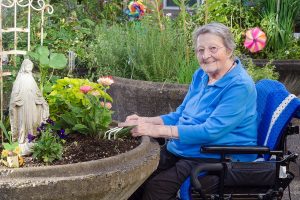
Reducing Skin Damage and Irritation in an Elderly Adult Dealing with Immobility or Limited Mobility
Caregiver in Monmouth Junction NJ
There are many reasons that an elderly adult may experience limited mobility or even periods of immobility. They might have suffered an injury or illness that requires long periods of rest, may  have undergone a surgical procedure or treatment from which they are recovering, or could be suffering from a particular health complication or situation that prevents them from being able to move much. Immobility and limited mobility can put your elderly parent at risk of a range of health complications, including diminished range of motion and flexibility, weight gain, muscle weakness, joint pain, decreased cardiovascular health, and decreased mental and emotional health. One issue that can be particularly pressing is skin damage and irritation. Long periods of sitting or lying down in the same place can place a tremendous amount of pressure on the skin and contribute to friction that can cause the skin to break down, create tears and sores, and become irritated, making your parent vulnerable to infection. It is important to focus their care on protecting their skin so that they do not experience these potentially devastating consequences.
have undergone a surgical procedure or treatment from which they are recovering, or could be suffering from a particular health complication or situation that prevents them from being able to move much. Immobility and limited mobility can put your elderly parent at risk of a range of health complications, including diminished range of motion and flexibility, weight gain, muscle weakness, joint pain, decreased cardiovascular health, and decreased mental and emotional health. One issue that can be particularly pressing is skin damage and irritation. Long periods of sitting or lying down in the same place can place a tremendous amount of pressure on the skin and contribute to friction that can cause the skin to break down, create tears and sores, and become irritated, making your parent vulnerable to infection. It is important to focus their care on protecting their skin so that they do not experience these potentially devastating consequences.
Use these tips to help your aging parent avoid serious damage and irritation to their skin when they are coping with reduced mobility or periods of immobility:
- Keep your loved one as mobile as possible. Even if your parent is completely unable to get up, they can still move occasionally to reduce pressure. Encourage them to change position in their bed or chair at least once every two hours to relieve the pressure on individual areas of the body. If they are not able to move themselves, you may need to physically assist them at changing their position. If they are able to move, help them to get up and move around as often as possible.
- Support the body. Keeping the body properly supported can make a tremendous difference in the pressure that is placed on the different body parts. Use cushions, pillows, and other devices to help support the body in different positions. Be sure to help them change positions regularly to relieve pressure.
- Clean the skin regularly. Skin that is not clean is at particular risk of damage and irritation due to reduced mobility. Make sure your parent’s skin is cleaned daily using warm, not hot, water, and gentle cleansers that do not contain potentially irritating ingredients such as colors, fragrances, and alcohol. After cleansing, ensure the skin is thoroughly dried.
- Reduce friction. Ask your parent’s doctor about using products such as cornstarch powder to keep the skin dry and reduce friction, both of which help to reduce the chances of irritation and damage caused by long periods of pressure.
If your elderly loved one has been dealing with limited mobility, whether due to surgery, illness, injury, or other complication, and you are concerned about their health and safety, now may be the ideal time for you to consider starting senior care for them. A senior home care services provider can be with your elderly parent on a fully customized schedule to develop a highly personalized approach to care, support, assistance, and encouragement that is designed to address their individual needs, challenges, and limitations, as well as the care that you give them. This encourages them to live the highest quality of life possible while remaining safe, healthy, comfortable, and independent. When it comes to protecting a senior with limited mobility from skin irritation and damage, or managing such concerns if it does occur, this care provider can be a tremendous source of care and assistance. They can help your parent understand the challenges that they are facing, provide personal care and hygiene support, and encourage mobility as much as possible.
If you or an aging loved one are considering hiring caregiver services in Monmouth Junction, NJ or the surrounding areas, please call Independence Home Care today at 609-208-1111 for more information.
Source: https://www.phc-online.com/pressure_sore_a/137.htm

